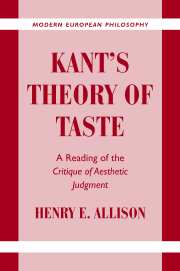Book contents
- Frontmatter
- Contents
- Acknowledgments
- Note on Sources and Key to Abbreviations and Translations
- Introduction
- PART I KANT'S CONCEPTION OF REFLECTIVE JUDGMENT
- PART II THE QUID FACTI AND THE QUID JURIS IN THE DOMAIN OF TASTE
- 3 The Analytic of the Beautiful and the Quid Facti: An Overview
- 4 The Disinterestedness of the Pure Judgment of Taste
- 5 Subjective Universality, the Universal Voice, and the Harmony of the Faculties
- 6 Beauty, Purposiveness, and Form
- 7 The Modality of Taste and the Sensus Communis
- 8 The Deduction of Pure Judgments of Taste
- PART III THE MORAL AND SYSTEMATIC SIGNIFICANCE OF TASTE
- PART IV PARERGA TO THE THEORY OF TASTE
- Notes
- Bibliography
- Index
4 - The Disinterestedness of the Pure Judgment of Taste
Published online by Cambridge University Press: 18 January 2010
- Frontmatter
- Contents
- Acknowledgments
- Note on Sources and Key to Abbreviations and Translations
- Introduction
- PART I KANT'S CONCEPTION OF REFLECTIVE JUDGMENT
- PART II THE QUID FACTI AND THE QUID JURIS IN THE DOMAIN OF TASTE
- 3 The Analytic of the Beautiful and the Quid Facti: An Overview
- 4 The Disinterestedness of the Pure Judgment of Taste
- 5 Subjective Universality, the Universal Voice, and the Harmony of the Faculties
- 6 Beauty, Purposiveness, and Form
- 7 The Modality of Taste and the Sensus Communis
- 8 The Deduction of Pure Judgments of Taste
- PART III THE MORAL AND SYSTEMATIC SIGNIFICANCE OF TASTE
- PART IV PARERGA TO THE THEORY OF TASTE
- Notes
- Bibliography
- Index
Summary
As already noted, the first moment of the Analytic of the Beautiful deals with the quality of the feeling in a pure judgment of taste, and this quality is said to lie in its being devoid of all interest or, more simply, disinterested. In introducing this thesis, Kant claims that “Everyone has to admit that if a judgment about beauty is mingled with the least interest then it is very partial and not a pure judgment of taste” (KU 5: 205; 46). The phrase “everyone has to admit” suggests that Kant took himself to be appealing to a view widely shared by his contemporaries, which he then used as a nonproblematic starting point for his account of taste. Recent work, however, has made it clear that this is not the case. In spite of being anticipated to some extent by theorists, such as Shaftesbury and Hutcheson, the view that the judgment or experience of beauty was disinterested, at least in the broad sense in which Kant understood this, was far from the prevailing opinion of aestheticians of Kant's time in either Great Britain or Germany.
In addition to being novel, Kant's conception of disinterestedness has also seemed to many to be highly problematic. The heart of the difficulty lies in the connection between interest and existence, which is built into the initial definition of interest as “the liking we connect with the representation of an object's existence” (KU 5: 204; 45). This entails that a disinterested liking, which is what the liking for the beautiful is supposed to be, must be independent of any concern for the existence of the object of that liking.
- Type
- Chapter
- Information
- Kant's Theory of TasteA Reading of the Critique of Aesthetic Judgment, pp. 85 - 97Publisher: Cambridge University PressPrint publication year: 2001



